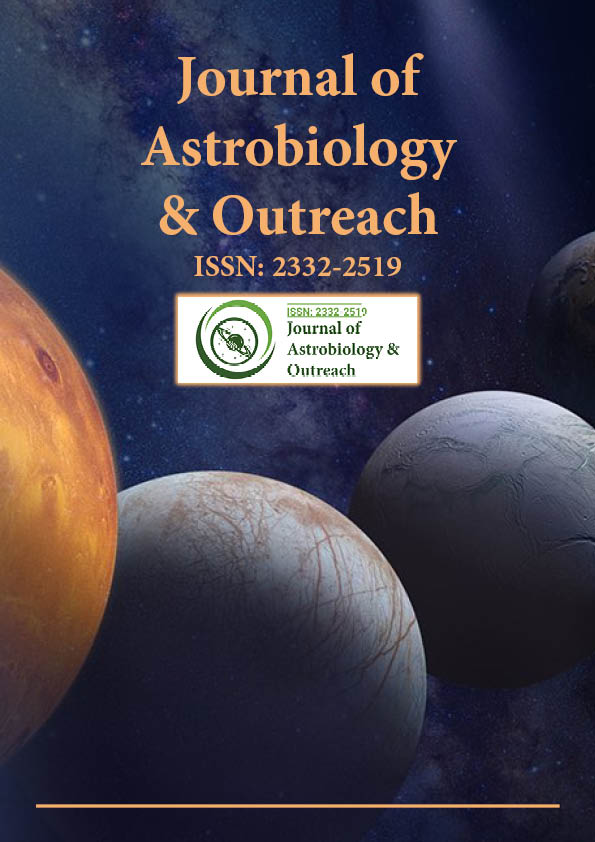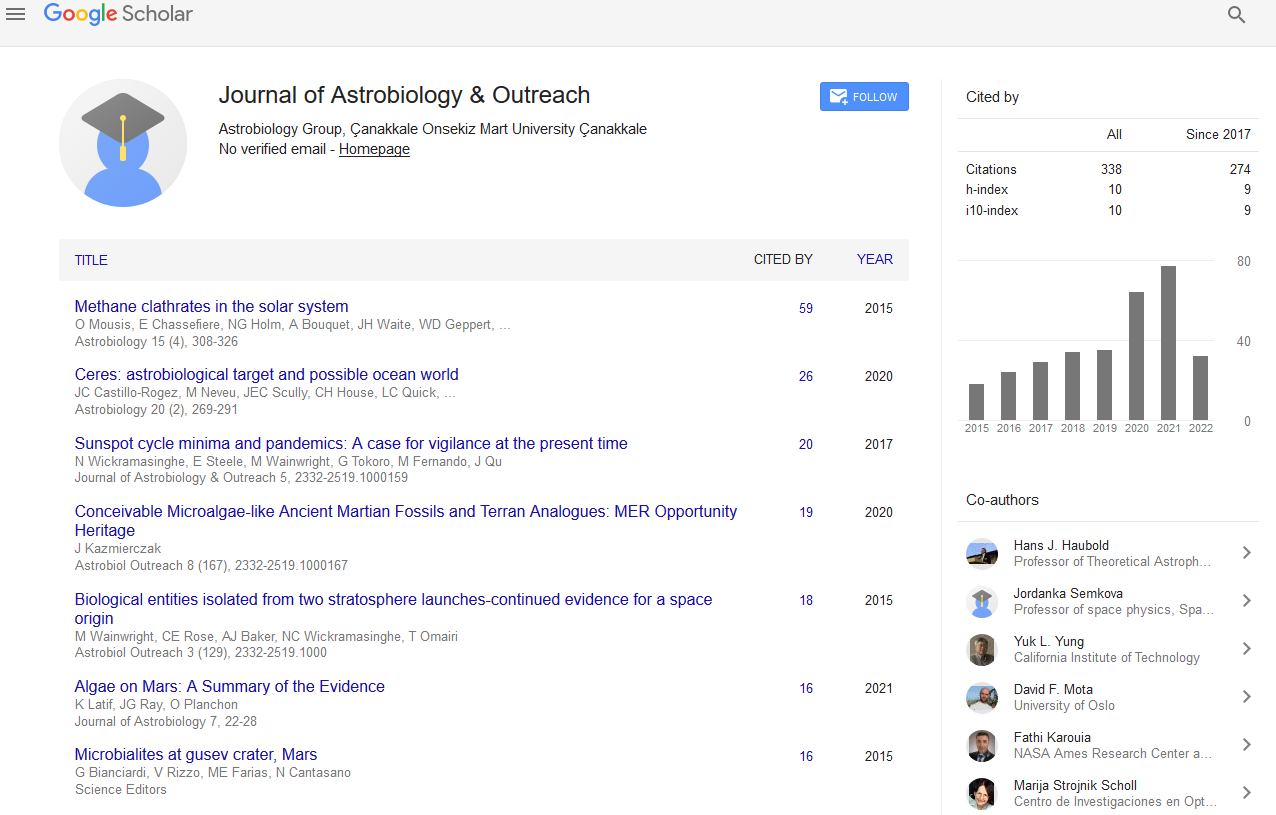Indexed In
- Open J Gate
- Academic Keys
- JournalTOCs
- RefSeek
- Hamdard University
- EBSCO A-Z
- OCLC- WorldCat
- Google Scholar
Useful Links
Share This Page
Journal Flyer

Open Access Journals
- Agri and Aquaculture
- Biochemistry
- Bioinformatics & Systems Biology
- Business & Management
- Chemistry
- Clinical Sciences
- Engineering
- Food & Nutrition
- General Science
- Genetics & Molecular Biology
- Immunology & Microbiology
- Medical Sciences
- Neuroscience & Psychology
- Nursing & Health Care
- Pharmaceutical Sciences
Commentary - (2023) Volume 11, Issue 3
Pioneering the Search for Life Beyond Earth in Planetary and Space Science
Anee Brigit*Received: 01-May-2023, Manuscript No. JAO-23-21756; Editor assigned: 03-May-2023, Pre QC No. JAO-23-21756 (PQ); Reviewed: 17-May-2023, QC No. JAO-23-21756; Revised: 24-May-2023, Manuscript No. JAO-23-21756 (R); Published: 31-May-2023, DOI: 10.35248/2332-2519.23.11.299
About the Study
Astrobiology, the interdisciplinary field that seeks to understand the origins, evolution, and distribution of life in the universe, has emerged as a prominent and captivating area of scientific exploration. This study provides a platform for leading scientists to share their findings, exchange ideas, and inspire further investigations into the profound questions surrounding the existence of life beyond earth.
Astrobiology encompasses a wide range of disciplines, including astronomy, biology, chemistry, geology, and planetary science. This study brings together contributions from experts across these fields, presenting a diverse array of topics that collectively contribute to our understanding of astrobiology.
One key focus of astrobiology research is the search for habitable environments, both within the solar system and in exoplanetary systems. These explore the latest techniques and technologies employed to identify potentially habitable worlds. Researchers employ a combination of remote sensing, spectroscopy, and modeling to study the atmospheric compositions, surface features, and potential liquid water on exoplanets. They also investigate the habitability of planetary bodies within the solar system, such as Mars, Europa, and Enceladus, assessing the potential for microbial life in subsurface oceans or beneath the icy surfaces of these celestial bodies.
Understanding the origins of life is another fundamental aspect of astrobiology. Scientists explore the roles of prebiotic chemistry, the availability of key building blocks, and the environmental conditions necessary for the development of life. They also investigate the potential for life to have originated elsewhere in the universe, exploring the possibility of panspermia, where life could have been transported through space and seeded on other planets or moons.
The study of extremophiles, organisms that thrive in extreme environments, is another exciting field within astrobiology. Researchers investigate the adaptations of extremophiles to extreme temperatures, high pressures, acidic or alkaline conditions, and other challenging environments. By studying these resilient life forms, scientists gain insights into the limits of life on earth and expand our understanding of the potential habitability of extreme environments on other planets and moons.
The search for bio signatures, indicators of life or its past existence is a crucial aspect of astrobiology research. Researchers investigate the use of spectroscopy, mass spectrometry, and other analytical tools to identify potential biomarkers and signatures of life. They also explore the challenges associated with distinguishing biological signals from abiotic processes, such as mineralogy or photochemistry. This research lays the groundwork for future missions to search for bio signatures on other celestial bodies, guiding the development of instruments and techniques to detect signs of life beyond earth.
As astrobiology advances and the search for extraterrestrial life intensify, it is essential to examine the ethical implications and societal impacts of potential discoveries. This study explores the philosophical, religious, and cultural aspects of astrobiology, as well as the broader implications for humanity's worldview. By engaging in these discussions, scientists aim to foster responsible research practices and ensure that astrobiology's societal implications are carefully considered alongside scientific advancements.
Conclusion
The topic on astrobiology in planetary and space science provides a comprehensive overview of the current state of astrobiology research. This reflects the interdisciplinary nature of the field, presenting advancements in various sub-disciplines, from the search for habitable environments and the study of extremophiles to the investigation of bio signatures and the exploration of life's origins. This study serves as a valuable resource for scientists, students, and enthusiasts interested in the captivating field of astrobiology, inspiring further exploration and fostering collaboration to unravel the mysteries of life's existence beyond earth.
Citation: Brigit A (2023) Pioneering the Search for Life Beyond Earth in Planetary and Space Science. J Astrobiol Outreach. 11:299.
Copyright: © 2023 Brigit A. This is an open-access article distributed under the terms of the Creative Commons Attribution License, which permits unrestricted use, distribution, and reproduction in any medium, provided the original author and source are credited.

